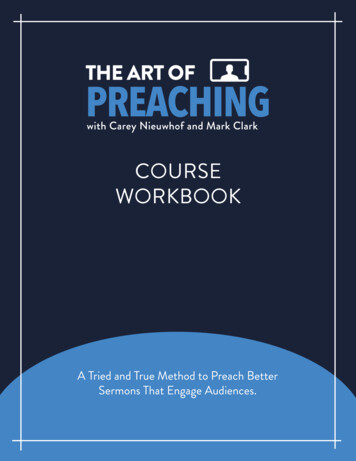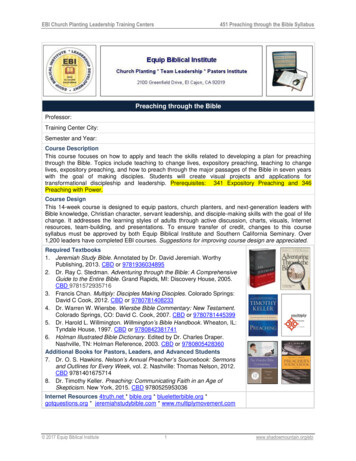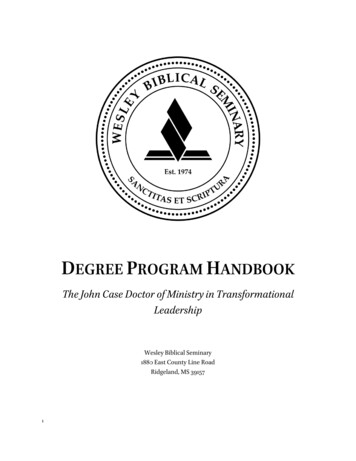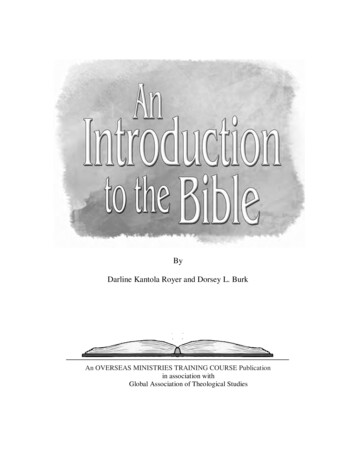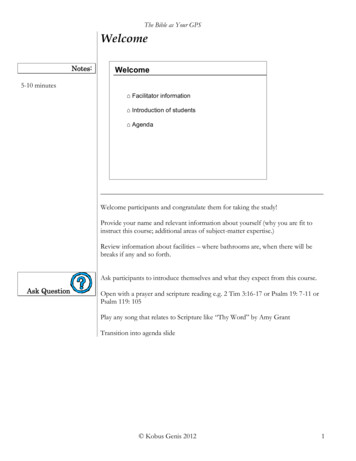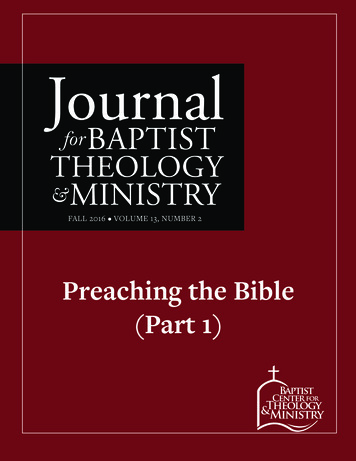
Transcription
FALL 2016 VOLUME 13, NUMBER 2Preaching the Bible(Part 1)
Fall 2016 Vol. 13, No. 2The Baptist Center for Theology and MinistryNew Orleans Baptist Theological SeminaryEditor-in-ChiefCharles S. Kelley, ThDExecutive EditorSteve W. Lemke, PhDEditor & BCTM DirectorAdam Harwood, PhD2016 EDITORIAL ADVISORY BOARDBart Barber, PhDFirst Baptist Church of Farmersville, TexasRex Butler, PhDNew Orleans Baptist Theological SeminaryResearch AssistantHoyt DentonNathan Finn, PhDUnion UniversityBook Review EditorsArchie England, PhDDennis Phelps, PhDEric Hankins, PhDFirst Baptist Church, Oxford, MississippiMalcolm Yarnell, PhDSouthwestern Baptist Theological SeminaryThe Baptist Center for Theology and Ministry is a research institute of New Orleans BaptistTheological Seminary. The seminary is located at 3939 Gentilly Blvd., New Orleans, LA 70126.BCTM exists to provide theological and ministerial resources to enrich and energize ministry inBaptist churches. Our goal is to bring together professor and practitioner to produce and apply theseresources to Baptist life, polity, and ministry. The mission of the BCTM is to develop, preserve, andcommunicate the distinctive theological identity of Baptists.The Journal for Baptist Theology and Ministry is published semiannually by the Baptist Centerfor Theology and Ministry. Copyright 2016 The Baptist Center for Theology and Ministry, NewOrleans Baptist Theological Seminary. All Rights Reserved. This peridiocal is indexed in the ATLAReligion Database (ATLA RDB ), http://www.atla.com.CONTACT BCTM(800) 662-8701, ext. BMISSIONSVisit the Baptist Center website for submission guidelines.
TABLE OF CONTENTSEditorial IntroductionAdam Harwood and Dennis Phelps1Hearing God’s Voice: A Practical Theology for Expository PreachingJim Shaddix3Hebrew Historical Narrative:Suggestions on How to Use it in Christian ProclamationRobert Bergen16Sermon: The Story of Hannah’s Pain—1 Samuel 1:1-20Robert Bergen26Interpreting Hebrew PoetryJeffrey G. Audirsch32Sermon: Psalm 23Jeffrey G. Audirsch59“That They May All Fear Me”: Interpreting and Preaching Hebrew WisdomDaniel I. Block68Sermon: “A Lizard in the King’s Palace”—Proverbs 20:24–28Daniel I. Block80Preaching the ProphetsPaul Wegner89Sermon: “Confident Faith in Uncertain Times”—HabakkukPaul Wegner102Book Reviews111
Journal for Baptist Theology and MinistryVol. 13, No. 2 2016Editorial IntroductionAdam Harwood, PhDAdam Harwood is Associate Professor of Theology, occupying the McFarland Chair of Theology;Director of the Baptist Center for Theology and Ministry; Editor, Journal for Baptist Theology andMinistry at New Orleans Baptist Theological Seminary.&Dennis Phelps, PhDDennis Phelps is Director of Alumni Relations and Church-Minister Relations; J. D. Grey Professor ofPreaching at New Orleans Baptist Theological Seminary.In the fall of 2014, Nathan Finn, a member of the JBTM editorial advisory board, emailedme (Adam) to suggest that the journal dedicate one or two issues to the topic of preachingthe various types of biblical texts, soliciting articles from pastor-scholars who would addresspreaching the specific literary genre, or types, as well as provide sermons which illustratethose principles. I presented the idea to colleague and friend Dennis Phelps, who serves asJ. D. Grey Chair of Preaching at NOBTS. After a period of prayer, reflection, and discussion,we extended invitations to a group of experts in the field of biblical studies and/or preachingto contribute articles and sermons for a two-volume release of JBTM. The present issuerepresents the first installment of that series, which is outlined as follows: Introduction – Jim Shaddix, W. A. Criswell Professor of Expository Preaching atSoutheastern Baptist Theological Seminary in Wake Forest, North Carolina Hebrew Historical Narrative (in Pentateuch and Historical books) – Robert D.Bergen, Associate Dean of Academic Affairs; Distinguished Professor of OldTestament and Hebrew at Hannibal-LaGrange University in Hannibal, Missouri Hebrew Poetry (in Job, Psalms, Proverbs, Song of Songs) – Jeffrey G. Audirsch,Associate Professor of Christian Studies at Shorter University in Rome, Georgia Hebrew Wisdom (in Job, Proverbs, Ecclesiastes, Song of Songs) – Daniel I.Block, Gunther H. Knoedler Professor of Old Testament at Wheaton College inWheaton, Illinois Hebrew Prophecy (in the Major and Minor Prophets) – Paul D. Wegner,Director, Academic Graduate Studies Program; Professor of Old TestamentStudies at Gateway Seminary in Ontario, California
JBTMAdam Harwood2Each essay provides guidelines for exegesis, hermeneutics, and homiletics that are significantfor that particular literary genre. The view which underlies all the articles and sermons isthat the shape of the genre relates to the shape of the sermon. All the contributors assumea high view of Bible-driven preaching and are in general agreement with the Baptist Faithand Message. The articles and sermons are followed by the largest selection of book reviewsJBTM has published in a single issue. The book topics include theology, biblical studies,history, ethics, and Christian ministry.The next issue of the journal plans to feature the following articles and sermons: Preaching Christ from the Old Testament – Russell Meek, Assistant Professorof Old Testament and Hebrew at Louisiana College in Pineville, Louisiana Gospels – Robert H. Stein, Senior Professor of New Testament Interpretation atThe Southern Baptist Theological Seminary in Louisville, Kentucky Greek Historical Narrative (in Acts) – Dennis Phelps, Director of AlumniRelations and Church-Minister Relations; J. D. Grey Professor of Preaching atNew Orleans Baptist Theological Seminary in New Orleans, Louisiana Greek Epistles (in Pauline & General Epistles) – David Allen, Dean of the Schoolof Preaching; Distinguished Professor of Preaching; Director of the SouthwesternCenter for Expository Preaching; and George W. Truett Chair of Ministry atSouthwestern Baptist Theological Seminary in Fort Worth, Texas Greek Apocalyptic (in Revelation) – Gerald L. Stevens, Professor of NewTestament and Greek at New Orleans Baptist Theological Seminary in NewOrleans, LouisianaIt is our desire that the articles, sermons, and book reviews in this issue will spur Christianleaders toward more precise exegetical and hermeneutical work which results in more robustproclamation of God’s Word and multitudes of changed lives.
JBTM3Hearing God’s Voice: A Practical Theologyfor Expository PreachingJim Shaddix, DMin, PhDJim Shaddix is W. A. Criswell Professor of Expository Preaching at Southeastern Baptist TheologicalSeminary in Wake Forest, North Carolina.Expository preaching is a sacred obligation, not a sermonic option. It is a stewardshippreachers have been given. Consider the rationale of the preaching task. V. L. Stanfield,one of my revered preaching predecessors at New Orleans Baptist Theological Seminary,described preaching as “giving the Bible a voice.”1 He concurred with John Broadus’s simpleand accurate definition of preaching as “letting God speak out of his Word.”2 In other words,Stanfield rightly saw the Bible as the written record of God’s voice, and preaching as the actof giving God his voice in the hearing of people.If the Bible is God’s voice, it follows that preachers are compelled to preach it. Theprophet Amos rhetorically asked, “The Lion has roared; who will not fear? The Lord God hasspoken; who can but prophesy?” (Amos 3:8).3 The Apostle Paul, citing Psalm 116:10, similarlyconfessed, “Since we have the same spirit of faith according to what has been written, ‘Ibelieved, and so I spoke,’ we also believe, and so we also speak” (2 Cor 4:13). John Stottrightly concluded:Here then is a fundamental conviction about the living, redeeming and self-revealingGod. It is the foundation on which all Christian preaching rests. We should never presumeto occupy a pulpit unless we believe in this God. . . . Once we are persuaded that God hasspoken, however, then we too must speak. A compulsion rests upon us. Nothing andnobody will be able to silence us.4Preaching, then, is rooted in basic assumptions that God has spoken, and he has orchestratedthe record of his words to be compiled and preserved in our Bible.5 These assumptions driveboth our hermeneutic and our homiletic.John A. Broadus, On the Preparation and Delivery of Sermons, 4th ed., revised by Vernon L. Stanfield (San Francisco: Harper and Row, 1979), 19.2Ibid.3All Bible quotations are from the English Standard Version.4John R. W. Stott, Between Two Worlds: The Art of Preaching in the Twentieth Century (Grand Rapids:Eerdmans, 1982), 96.5The terms Bible, Scripture, and Word are used synonymously and interchangeably by the author.1
JBTMJim Shaddix4Because God has spoken and the Bible is the accurate record of his speech, we arecompelled to communicate it accurately so that we represent God rightly. Biblical exposition,then, ought to serve as our foundational approach to preaching. In exposition, the preacherlays open a biblical text—God’s voice—in such a way that its intended meaning is broughtto bear on the lives of the listeners. The word expose means to lay open or uncover, and itincludes the totality of the preacher’s exegesis, hermeneutics, and homiletics. Expositorypreaching of the Bible, then, provides the only chance we have to preserve God’s voicecorrectly and reveal it to listeners accurately. Six theological footings anchor this conviction.The Inspiration of the BibleThe practice of biblical exposition is first and foremost driven by a high view of Scripture,which itself depends on a certain conviction about biblical inspiration. By “inspiration” I amreferring to “the supernatural work of the Holy Spirit that enabled and motivated the humanauthors of Scripture to produce an accurate record and revelation of God’s redemptive will,purpose, and activity.”6 Preaching has to be driven by an understanding that the text ofScripture accurately records God’s voice. Merrill F. Unger asserted, “If the Bible is consideredmerely to contain the Word of God, rather than actually to be in toto the Word of God, thereis naturally a decreased sense of responsibility to study its text minutely, or to systematizeits theology, or authoritatively to declare its message.”7 The conviction that the Bible is God’sWord dictates everything in both the preparation and delivery of sermons.The doctrine of verbal plenary inspiration frames up these convictions about Scripture aswell as preaching. This doctrine suggests that “in the composition of the original manuscripts,the Holy Spirit guided the authors even in their choice of expressions—and this throughoutall the pages of the Scriptures—still without effacing the personalities of the different men.”8Inspiration is verbal because the words are inseparable from the message. Inspiration isplenary because it is entire and without restriction.9 Frank E. Gaebelein said, “The doctrineof plenary inspiration holds that the original documents of the Bible were written by men,who, though permitted the exercise of their own personalities and literary talents, yet wroteunder the control and guidance of the Spirit of God, the result being in every word of theoriginal documents a perfect and errorless recording of the exact message which God desiredto give to man.”10James D. Hernando, Dictionary of Hermeneutics (Springfield, MO: Gospel, 2005), 26. See also Stanley Grenz, David Guretzki, and Cherith Fee Nordling, Pocket Dictionary of Theological Terms (DownersGrove: InterVarsity, 1999), 66; Millard Erickson, Christian Theology, 2nd ed. (Grand Rapids: Baker,1998), 199.7Merrill F. Unger, Principles of Expository Preaching (Grand Rapids: Zondervan, 1955), 18.8René Pache, The Inspiration and Authority of Scripture (Chicago: Moody, 1969), 71.9Ibid., 72–73.10Frank E. Gaebelein, The Meaning of Inspiration (Chicago: InterVarsity, 1950), 9.6
JBTMJim Shaddix5The Bible itself makes its own claims about its divine origin. Paul asserted that “allScripture is breathed out by God” (2 Tim 3:16), suggesting the divine source of the words wehave in our Bible. Peter wrote that “prophecy never came by the will of man, but holy men ofGod spoke as they were moved by the Holy Spirit” (2 Pet 1:21). Essentially, these men werecarried along by the Holy Spirit much like a sailboat is carried along by the wind. They weresuperintended by the Holy Spirit, giving Scripture a dual authorship—the Holy Spirit as thesole Divine Author and a company of divinely chosen men as human authors. God broughtthis whole process about through the unique personalities of individual writers, each onebeing fashioned by the circumstances of his own life and the genetic combination of his ownpersonality, yet all the while being filled by the breath of the divine Spirit.Some have tried to suggest that no relationship exists between the preacher’s viewof inspiration and the way he preaches. Andrew Blackwood wrote, “Fortunately a man’seffectiveness in the pulpit does not depend upon his theory of inspiration.”11 But if Scripturetruly is inspired by God, then nothing could be farther from the truth. If the Bible is inspiredby God, and preaching gives the Bible a voice, there is an essential relationship betweeninspiration and the way we preach. We must preach in such a way that our sermons rightlyreflect the very voice of God.This obligation demands that the preacher’s sermon journey begins with finding out whatGod has said. He cannot stand up and say “Thus saith the Lord” if he does not know whatthe Lord saith! That is why H. C. Brown Jr. asserted that the basic question to be asked abouta sermon is: “‘Who said it?’ That is, does the preacher speak from the Bible or merely fromhis own experience? . . . Therefore, one must always ask about a sermon, ‘Who said it? Thepreacher or the Bible?’”12 When the eternal truth of God is revealed, the people, in essence,are hearing the very voice of God instead of the voice of the preacher.Brown’s correct assertion begs another crucial question: How does this happen? Howdoes the preacher go about rightly reflecting what God has said? After all, regarding thepreaching and teaching gifts, Peter said, “If anyone speaks, let him speak as the oracles ofGod” (1 Pet 4:11). So how does the preacher speak the oracles of God in such a way that hiswords rightly reflect what the Holy Spirit gave to us? The only logical answer to this questionis the exposition of biblical texts, or expository preaching. This process alone maintains theintegrity of the Holy Spirit’s intended meaning in any given text of Scripture. Consequently,exposition is the natural outgrowth of what the Spirit has inspired the text to say and mean.The Revelation of the BibleThe responsibility of expository preaching not only grows out of how God spoke throughAndrew Blackwood, Preaching from the Bible (New York: Abingdon, 1941), 182.H. C. Brown Jr., A Quest for Reformation in Preaching (Nashville: Broadman, 1968), 88.1112
JBTMJim Shaddix6inspiration of the Bible, but also from when he spoke it and gave it to mankind. Wherecontemporary preachers stand in relation to the time in which God revealed his Word saysmuch about how we preach. I have heard more than once the seemingly spiritual call forcontemporary preachers to preach more like the prophets, Jesus, and the apostles. Certainly,the quest to preach like the Bible preachers preached is a noble one . . . unless we fail to realizewe have not been called to preach like they did. An important difference exists betweenpreaching now and preaching then. In fact, the role of every preacher after the apostolic agehas been fundamentally different than that of preachers before them. And that differenceactually provides one of the strongest rationales for biblical exposition.During the biblical period, preachers like Old and New Testament prophets, Jesus, andthe apostles often were giving revelation in their preaching. They communicated things Godsaid that people had never heard before. It was new information because God had never saidit before. But those preachers also did a lot of explanation in the sermons they preached.Sometimes they were not giving new information, but simply providing explanation of stuffthat had already been revealed. Additionally, they did a lot of persuasion in their preachingbased both on what had been revealed as well as on what they had explained. Under theleadership of God’s Spirit they appealed to people to respond by saying “yes” to what he hadsaid.13As the sun set on the biblical period, however, some things changed. First, God’s voicewas funneled into the Christ event, and his words were fulfilled totally and completely in hisSon. The author of Hebrews summarized, “Long ago, at many times and in many ways, Godspoke to our fathers by the prophets, but in these last days he has spoken to us by his Son,whom he appointed the heir of all things, through whom also he created the world” (Heb1:1–2). About this astounding declaration, David Allen writes,Amazingly, the author viewed the revelation of the Son as God’s “speech” to us, and thusit is an appropriate metaphor for all that God does through Christ in the world and not justin reference to the words of Christ. Additionally, when Scripture speaks of the “word of theLORD” addressed to and through Old Testament prophets, the Son, as the second Personof the Trinity, is always involved as well.14Second, God’s special revelation—which the early church understood to be the accuraterecord of God’s revelatory works and words15—was canonized to form the Old and NewTestaments that comprise our Bible.16 Bryan Chapell writes, “Each verse, each recordedevent, and each passing epoch of biblical history God uses to build a single, comprehensiveJim Shaddix, The Passion-Driven Sermon: Changing the Way Pastors Preach and Congregations Listen(Nashville: B&H, 2003), 71–72.14David L. Allen, Hebrews, New American Commentary 35 (Nashville: B&H Academic, 2010), 104.15Hernando, Dictionary of Hermeneutics, 36.16Ibid., 15.13
JBTMJim Shaddix7understanding of who he is.”17 Thus, the voice of God that reveals who he is and the missionhe is on became contained in the Bible.One of the natural results of the canonization of Scripture was that preaching simplified.Instead of involving the revelation, explanation, and persuasion that characterized thebiblical period, preaching evolved to include only explanation and persuasion. The closingof the canon, so to speak, marked the end of God’s revelation of new material, at least as faras what he determined was necessary to be passed on through the ages to accomplish hispurpose. And every preacher since that time has enjoyed the blessing of not living underthe pressure of being responsible to introduce new information from God. Why? Because hestopped giving new revelation about “all things that pertain to life and godliness” (2 Pet 1:3)and encapsulated them in the person of Jesus Christ. Since that time preachers have beencharged only with the responsibility of explaining what God has already revealed in Christand persuading people to act on it.That reality magnifies the characteristic that is at the very heart of biblical exposition—explanation of the biblical text. Broadus, reflecting the influence of rhetoric on latenineteenth century homiletics, identified four functional elements in preaching: explanation,argumentation (proof), illustration, and application. Of these four, he identified explanationas being “among the primary functions of the preacher.”18 And it is not difficult to understandwhy. Essentially, the other three elements are servants to explanation. While some of thesefunctional elements at times overlap, explanation fundamentally drives the train. We donot just do application; we apply something. We do not just use illustrations; we illustratesomething. We do not just do argumentation; we argue something. And that something is thetruth of God’s Word rightly explained and understood. The text has to be explained in orderfor us to do the other elements of good preaching. Steven Smith insightfully has describedpreaching as “re-presenting the Word of God.”19 He writes, “This is a theology of preachingin one sentence: we speak for God because he has already revealed himself in his Son and hisSon has revealed himself in his Word. This book is God’s communication with us. . . . We havean obligation to re-present what God has already said. So, we have to get at the meaning.”20So the default approach to preaching must be, by necessity, to explain what God has alreadyrevealed in his Word and persuasively apply it to people’s lives so they can obey it.The preacher’s responsibility, then, is to peel back the layers of language, culture,background, worldview, literary genre, and more that characterize the difference betweenBryan Chapell, Christ-Centered Preaching: Redeeming the Expository Sermon (Grand Rapids: Baker,1994), 270.18John A. Broadus, A Treatise on the Preparation and Delivery of Sermons (Philadelphia: Smith, English, & Co., 1873), 145.19Steven W. Smith, Recapturing the Voice of God: Shaping Sermons Like Scripture (Nashville: B&HAcademic, 2015), 1.20Ibid., 1–2.17
JBTMJim Shaddix8then and now. He does so in order to expose the truth and all its relevance. This makesexposition more than a sermon form defined by the length of a given text, a particularrhetorical form, or a Bible book series. Exposition is a journey that begins long before thesermon is developed or preached. Essentially, exposition describes the manner of treatmentwith which Scripture is handled, a process by which the preacher discovers and encountersthe true voice of God. In the sermon that has been birthed from this process, he explainsenough of his journey to his listeners to enhance their understanding of the truth and itsrelevance for their lives.The Nature of the BibleAnother theological mooring that grounds the practice of biblical exposition is the natureof this Bible that contains God’s inspired and revealed voice. Contemporary Christian culturehas a tendency to view the Bible as nothing more than a practical manual for daily living. Wedemand relevance, we long for practical application, and we gravitate toward what works.This earthy view of the Bible, while not totally without merit, has serious ramifications. Itcauses us to overlook some of the Bible’s most important qualities. For example, the Bible istheocentric not anthropocentric; it is God-centered not man-centered; it is a book about Godbefore it is a book about us. To make it otherwise is both selfish and arrogant. When we runquickly in our consideration of God’s Word to the “how to” mentality of anthropocentricity,we often run right past the revelation of Almighty God in theocentricity. Additionally, theBible is much more than just a book about God. It is a book from God. When the ApostlePaul told the Corinthians he had come to them declaring “the mystery of God” (1 Cor 2:1),he used the possessive “of God” to convey his understanding of the nature of Scripture. Paulconsidered his message to be the testimony that God gave inasmuch as it had God as itscontent. It was both from God and about God.As a message both from God and about God, its specific content was intended to bedelivered to people in a way that accurately represents what God has to say to them. Apreacher can take just about any subject under the sun and somehow relate it to somethingabout God from some place in Scripture. Just because a message is about God, however, doesnot mean that it is the message God intended people to hear. This is a subtle yet significantqualification for biblical exposition. Right preaching is not validated on the basis of itsrelational proximity to the idea of God. Preachers have been given a very specific messageto deliver, and that message does not always include all things God-related. It is a specificmessage that God dictated and intended for a specific purpose (which I will address below).The Bible’s God-centered and God-dictated nature creates a tension in preaching.Preachers—especially pastors—rightly want to meet people’s needs and heal their hurts. Butwhat is a preacher to do when the Bible’s God-centered and God-dictated message offersno specific and practical help for certain life situations? When that happens the preachernaturally feels the temptation to take his content from sources other than the Bible. He
JBTMJim Shaddix9may justify this move by noting that this extra-biblical information—often couched in lifeapplication, felt-needs, and topical sermons—is not usually heretical in nature. It is quitepossibly helpful wisdom for anyone to follow. But just because something is not heresydoes not mean it faithfully represents the inspired Word of God, especially when it involvessubjects to which God did not directly speak.I liken this subtlety to the distinction between God’s stuff and good stuff.21 God’s stuffis the body of truth that is revealed in the Bible, given for the purpose of accomplishingGod’s agenda. It is the true nature of the Bible. Good stuff, on the other hand, is all thehelpful advice and practical information we get in life that is not necessarily drawn directlyfrom biblical teaching, but instead from information or principles that we glean from simpleobservation and research.To illustrate the difference, consider some topics that God clearly addresses in the Bible.The old and new covenants, justice, holiness, the crucified life, the church, the ordinances,forgiveness, the second coming, and more are all topics to which God has specifically andclearly spoken on the pages of Scripture. All of those subjects are clearly God’s stuff, and weshould glean our understanding of them from applying good hermeneutics in our Bible study.By contrast, a therapist can observe enough people dealing with stress on the job in orderto glean certain helpful principles for relieving stress. A marriage counselor can observeenough people recovering from divorce to identify some helpful guidelines for navigatingthat crisis. Parenting experts can talk with enough moms and dads to be able to delineatesome practical ways for raising strong-willed children. And while general Bible truths can beidentified that relate to these and other life experiences, it would be difficult to conclude thatGod addressed any of them specifically and directly in his Word. That stuff is good stuff, butwe cannot categorize it as biblical truth.Preachers have not been given the responsibility of addressing all things good and helpful.They have been charged with the task of speaking only what God has spoken. Stott pointedlyasked, “How dare we speak, if God has not spoken? By ourselves we have nothing to say.To address a congregation without any assurance that we are bearers of a divine messagewould be the height of arrogance and folly. . . . If we are not sure of this, it would be better tokeep our mouth shut.”22 While all truth certainly is God’s truth, he has sovereignly chosen toinclude in the Bible only the truth that is necessary to accomplish his eternal purpose. Thepreacher’s authority to say “Thus saith the Lord,” therefore, is not in good stuff but God’sstuff. Consequently, he is compelled to rightly interpret, exegete, and proclaim biblical truthin such a way that it is free to accomplish God’s purpose. And that kind of exegetical andhermeneutical rubric will issue forth in only one kind of preaching—biblical exposition. Thispractice is the only way for the preacher to be true to the Bible’s nature.Jerry Vines and Jim Shaddix, Power in the Pulpit (Chicago: Moody, 1999), 58–59.Stott, Between Two Worlds, 96.2122
JBTMJim Shaddix10The Purpose of the BibleThe natural corollary to the theocentric DNA of the Bible is the purpose of the Bible.The theocentric nature of God’s Word necessitates that we lean in a bit further to considerthe specific reason for which the Bible was given, a reason which obliges us to preach itexpositorily. During the “battle for the Bible” that took place in my denomination duringthe last three decades of the twentieth century, issues like the Bible’s inerrancy, infallibility,authority and sufficiency were frequent topics of debate. Little was said, however, about thepurpose of Scripture. Yet this neglected issue has as much to do with how we preach as anyof the others.What you think about the purpose of the Bible largely will determine how you approachyour preaching. If you think the Bible’s purpose is just to get people converted, then most ofyour sermons will be evangelistic. If you think the Bible was intended to be an answer bookfor all of life’s questions, then your sermons will generally pose and answer questions youthink your listeners are asking. If you think the Bible was given to be a practical manual fordaily living, then your sermons will take the nature of “how-to” messages on how to navigatelife.23 The simple fact, however, that the Bible says more to God’s people than it does tounbelievers indicates its purpose could not be limited to conversion. All we have to do iscome up with one question that the Bible fails to answer (e.g., What about dinosaurs?) or onelife issue that it does not address (e.g., raising strong-willed children!) to prove the Bible wasnot given to us for those purposes. So why do we have the Bible? What purpose does it serve?The answer is clear in just a brief survey of the biblical canon. The Apostle Paul set thetable for the answer when he told the Roman believers that the people whom God foreknew,“he also predestined to be conformed to the image of his Son, in order that he might be thefirstborn among many brothers. And those whom he predestined he also called, and thosewhom he called he also justified, and those whom he justified he also glorified” (Rom 8:29–30). Before time began, God determined to sav
Ministry at New Orleans Baptist Theological Seminary. & Dennis Phelps, PhD Dennis Phelps is Director of Alumni Relations and Church-Minister Relations; J. D. Grey Professor of Preaching at New Orleans Baptist Theological Seminary. Editorial Introduction I n the fall of 2014, Nathan Finn, a member of the JBTM editorial advisory board, emailed


